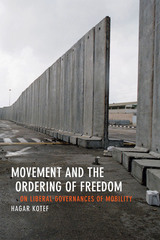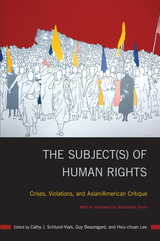Movement and the Ordering of Freedom: On Liberal Governances of Mobility
Duke University Press, 2015
eISBN: 978-0-8223-7575-3 | Paper: 978-0-8223-5855-8 | Cloth: 978-0-8223-5843-5
Library of Congress Classification JC585.K68 2015
See other books on: Freedom | Liberalism | Liberty | Movement | Social mobility
See other titles from Duke University Press
eISBN: 978-0-8223-7575-3 | Paper: 978-0-8223-5855-8 | Cloth: 978-0-8223-5843-5
Library of Congress Classification JC585.K68 2015
ABOUT THIS BOOK | AUTHOR BIOGRAPHY | REVIEWS | TOC | REQUEST ACCESSIBLE FILE
ABOUT THIS BOOK
We live within political systems that increasingly seek to control movement, organized around both the desire and ability to determine who is permitted to enter what sorts of spaces, from gated communities to nation-states. In Movement and the Ordering of Freedom, Hagar Kotef examines the roles of mobility and immobility in the history of political thought and the structuring of political spaces. Ranging from the writings of Locke, Hobbes, and Mill to the sophisticated technologies of control that circumscribe the lives of Palestinians in the Occupied West Bank, this book shows how concepts of freedom, security, and violence take form and find justification via “regimes of movement.” Kotef traces contemporary structures of global (im)mobility and resistance to the schism in liberal political theory, which embodied the idea of “liberty” in movement while simultaneously regulating mobility according to a racial, classed, and gendered matrix of exclusions.
See other books on: Freedom | Liberalism | Liberty | Movement | Social mobility
See other titles from Duke University Press




























